Intro and Question
So I’ve gotten myself in another letter exchange. This time with JS Kasimir, who claims to be a deist. I don’t think I’ve ever run into a deist before, so this should be interesting.
Our discussion began when I responded to
by saying
So much of the problem with 'patriarchy' is in the definition. I would certainly be willing to say that patriarchy is alive, and well, and will remain so because it’s intrinsic to the human condition. But not if you force me to allow feminists to define what patriarchy actually is. Or was, or however you put it.
The word 'patriarch' means 'father-rule' …
To which JS replied
After a few more exchanges, we agreed eagerly to do a letter exchange under the title: The Inevitability of Patriarchy: Yea or Nay… and JS graciously let me take the infinitely easier ‘yea’ position.
Where does JS Disagree?
Now my first statement in this exchange must be a question, “Where does JS disagree?” Because there are a lot of ways to disagree with the statement ‘Patriarchy is inevitable’. And some of them I might agree with.
First of all, by ‘inevitable’, I do NOT mean, “Will be worked out in the exact same way, to the exact same extent, in all possible human cultures at all times in history.” I fully agree that, from society to society, what I am calling ‘patriarchy’ will be worked out in different ways, to different extents, with different results. I also fully admit that there will be bumps in the road. That it will happen that a society was very patriarchal in the past, and will be very patriarchal in the future, is not (or does not seem to be) very patriarchal right now.
I also agree that there are technological (including medical) issues which might, indeed have, moderated the working out of patriarchy in one society or another; and particularly in the more ‘advanced’ societies of ‘the west’ right now. I would argue that these cannot be complete or permanent, but I would not argue that they do not exist.1
So it might be that, with all of those caveats, JS throws up his keyboard and says, “Well, of course I agree with that! If you put all those qualifications on it!”
The Definition
So having perhaps ruined the letter exchange already, I will turn to the definition that I am using. If JS (or any of the commentators, which are very welcome) have a different definition, well and good. But like Greg Bahnsen said in ‘The Great Debate’, I might agree with them… that their definition of patriarchy describes something that is not inevitable. I will only be defending my definition of patriarchy and only be claiming what it describes is inevitable, not theirs.
My definition is largely taken from my post ‘The Problems with Patterns of Patriarchy’ , which I encourage everyone to read. (I suppose all substackers encourage their audience to read all of their posts, but in this case it is a rather full exposition of much of the definition, and will be helpful in understanding this post. JS has read it, so I’m not cheating.)
I wrote there:
A patriarchal society, both from the old definitions and from an examination of history, is one in which fathers rule. Societies with strong family jurisdictions where the male head of multiple households, even after he is dead, continues to have strong actual authority. People actually do what he says. Father-ruler.
Thus a patriarchal society is one in which fathers rule, and the more that fathers (and the adjacent) rule, the stronger a society is patriarchally.
In this post I will largely be focused on laying out some aspects of that definition and thus the groundwork for future discussion.
The Opposite(s)
I think it is very important for me to lay out what the ‘opposite’ of patriarchy is. And isn’t.
Patriarchy could be said to have two, or even three, opposites. And some of them are more opposite than others. One of them might even be said to be a form of patriarchy.
Lest someone argue that there can’t be two opposites to the same word, let me propose a word that has three opposites! Two of them we use all the time, and the third is the most opposite! It is the word ‘boy’.
When children are playing on the playground at recess, and one of them speaks of the word ‘boy’ in a sense that implies the opposite, the word they would most often use is ‘girl’. “You,” they might say, “Aren’t a boy! You can’t play!” Or, contrariwise from the other camp, “We don’t allow boys to play! (We only allow girls.)”
The young person with male bits is being contrasted with the young person with female bits. One of these, the argument goes, is not like the other… and you fall on the wrong side.
But the boy’s problem doesn’t end there! When he is hanging around with older people who, like him, have male bits; he finds out that there is another opposite! “You can’t do this,” he is told. “You are just a boy!” Here ‘boy’ is being contrasted with ‘man’ on the ‘young to old’ scale, and he finds himself short. (Literally).
And the ‘real’ opposite of ‘boy’, the one no one ever uses, is ‘woman’. Surely ‘Old Female’ is the logical contrast to ‘Young Male’! But in my entire life, outside of logical reasoning, and mostly by me, I don’t think I have ever heard anyone use this contrast!
So, I’m going to stand firm on my idea that a word can have more than one opposite:
Matriarchy
Matriarchy would seem to be the most obvious opposite to patriarchy. But in a very real sense, it isn’t an opposite at all; it is a derivation of patriarchy. The word ‘patriarchy’ has two parts, after all: Father and ruler. Matriarchy keeps one of those parts: ruler. In a matriarchal society, we might have a whole series of behaviours that are remarkably similar to that of a patriarchy. The only difference is the sex of the person ‘on top’. They are elevated because of their age, perceived or actual wisdom, accumulated power, number of offspring, value of offspring, etc etc… just not on their male sex.
And everything that I have read on so-called ‘matriarchies’ really just involves some particular legal or cultural question… how lineage is counted, or what hut they all live in. Not the issues that I address in my definition of patriarchy.
I wonder if that is what JS will argue. That society naturally tends toward matriarchy??
Anarchy
Which brings us to anarchy. Or ‘an-archy’… no rule. A denial of rule. However, as all but the most die-hard and foolish anarchists will admit, that is a situation which only lasts for a minute or two. Whenever a society has ‘descended into anarchy’ the next sentence in the history books is ‘And then there arose…”. It might be extremely local arises. It might be a hundred small chieftains or even a thousand heads of families. But from the ashes of disaster, from the destruction of historical power, arises something. Some power or powers, some authority or authorities.
Equality
I think that the real opposite that most (modern) people think of when they think of the opposite of patriarchy is ‘equality’.
Now the first thing I would say about equality is that if it doesn’t exist, it can’t exist. Artificial equality is not equality. It is merely disguised inequality.
I was listening to a podcast the other day and there was a bright young quasi-feminist on. She lived in England, and she was complaining about the unsafe streets. “It is hard for a female,” she said (she might have said ‘woman’ or even (gasp) ‘girl’.) to walk to her car at night unless the carpark (American: Parking Lot) is very well lit and in a safe part of town, without worrying about being assaulted.”
Fair enough. As a patriarch, I fully appreciate your fear, Darling. So let me…
“What we need,” she emphasised, “is for the government to make sure our streets are safe.” Then she hurriedly went on to say, “What we don’t need is for some bloke (American: guy, man, male) to offer to walk us to our car!”
So… instead of a real, live, helpful male adult human being offering chivalrously to walk you to your car, you wish Big Brother to have such an overwhelming presence in every single carpark in all of England that no bloke feels safe attacking you (which may not stop him, actually). She wishes to replace one man with another. A real, live, helpful man with an omnipresent government man.
Even we blokes understand that not all blokes are created equal. I feel a lot less safe walking through a dark alley at night than, say, Jack Reacher or Dingo Chavez would.
If two things are not equal to start with, you can’t make them equal… you can only create an artificial seeming of equality. You can handicap one horse, or let the slow runner start ahead in the race… but that doesn’t make the jockeys of equal weight or make the fat boy run any faster. It just means we might cheer him when he crosses first.
I have heard a lot about equality in marriage and family. But the overwhelming majority has been nagging and complaining. Article after article with (mostly women) talking about how unfair it was that their husbands did so little housework and/or wanted sex so often.
So if anyone wishes to make the argument that what is inevitable in human relations is ‘equality’, I will get out my lawn chair and some crackers and cheese (I don’t happen to like popcorn much) and watch with interest.
The Adjacent
One exceedingly important part of my ‘definition’ of patriarchy is the idea of ‘adjacent’. If it is not understood, then much of my argument will fall by the wayside, like the unfruitful seed in the parable.
I argue that in a patriarchy, power, influence, and prestige do not merely rest with the singular ‘patriarch’, but with all of those adjacent to him. The only true patriarch is the bloke who has been dead for a hundred years but whose children are still obeying his precepts and honouring his name (see Jeremiah 35). But the current grandfather who gets honour and respect from his brood of grand and great-grandchildren is ‘adjacent’ to that rank.
And his wife, the grandmother, is adjacent to the grandfather. Woe betide the grandchild who backtalks their grandmother in my presence! And the father is adjacent in a different way. And the mother… and even the young girl about to get married is seen as on the ladder of patriarchy.
It’s not a difficult concept. Sure, they play ‘Hail to the Chief’ when the current occupant of the White House walks into the room. But the guy who has the ear of the chief of staff…
The Time Frame
Getting back to our potential disagreement, one important question for JS to answer is his time frame. Is JS merely saying that while patriarchy was inevitable in our ‘caveman’ age it has been made un-inevitable now? Or is JS willing to argue that even the cavemen could, just as easily, have had some other form of natural hierarchy?
Is JS making the obvious claim that birth control, the washing machine, and the computer have made the differences between men and women less significant than they were, and then peering off into the dim future when all such differences will be overcome with technology?
And Jeremiah said unto the house of the Rechabites, Thus saith the LORD of hosts, the God of Israel; Because ye have obeyed the commandment of Jonadab your father, and kept all his precepts, and done according unto all that he hath commanded you:
Therefore thus saith the LORD of hosts, the God of Israel; Jonadab the son of Rechab shall not want a man to stand before me for ever.
Jeremiah 35:18-19
Conclusion
I believe that one natural tendency of mankind, over the ages, in all cultures, can be described by the term ‘patriarchy’, properly defined. I believe that there will always exist, in every human society, both a need for and a tendency to, hierarchy, and that the most obvious and natural hierarchy to form is that of ‘father-ruler’.
There is an old saw, “A difference which makes no difference is no difference”. I would say that the obvious corollary to that is “Differences make differences”. The hundreds, indeed thousands, of differences between men vs women, older men vs younger men, fathers vs childless men, will tend to work themselves out in ways that give more power and authority to the male. The natural features of marriage and child raising will mean that male power will tend toward older married men with children; and will not tend to reside in young, unmarried, or childless men, and still less in women.
The historical result of those tendencies, working together, will be that societies tend toward having ‘fathers’. George Washington is not described as ‘the CEO of our country’, but ‘the father of our country’. The male head of a lineage, along with those adjacent to him, will be the natural location for power in all of its manifestations.
Links
The Feminist Problem with Patriarchy
I was reading a post (which I have since lost, unfortunately, or I would link it. If anyone can find it, please feel free to mention it in the comments) where the author, having read someone else, (see why it would be nice if I had the article?) mentioned that while men face sexual rejection, women face rape. Or a higher incidence of sexual rejection an…
Problems with Patterns of Patriarchy
I read a fascinating article by Lorenzo from Oz, which was cross-posted by Helen Dale. I think the article was well worth reading and a decent attack on a lot of progressive nonsense. It got me thinking about the subject, which prompted me to write a reply post. If the author ever sees my post, well and good, I will be happy to reply to him or anyone el…
Depopulation Solutions
John Carter published an article entitled Depopulocalypse III – From SINK to FLOAT. In it, he was talking about solutions for the depopulation crisis. It was behind a paywall but has since come out. I recommend you read the article and the entire series. His solutions are interesting and cover a wide range of issues.
Contract Marriage Intro
And the rib, which the LORD God had taken from man, made he a woman, and brought her unto the man. And Adam said, This is now bone of my bones, and flesh of my flesh: she shall be called Woman, because she was taken out of Man. Therefore shall a man leave his father and his mother, and shall cleave unto his wife: and they shall be one flesh.
Indeed I would argue that our current demographic trend is showing why our denial of patriarchy will come to an end. Our society is not having children (a strong patriarchal value). It will end as a result.

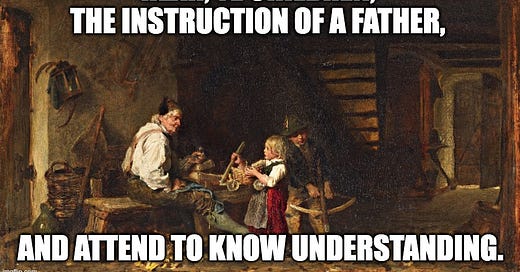



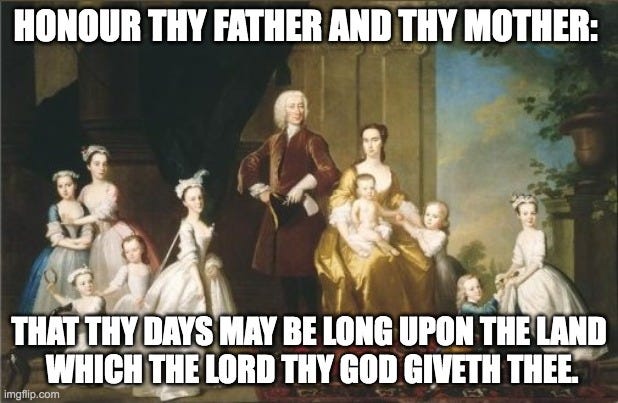
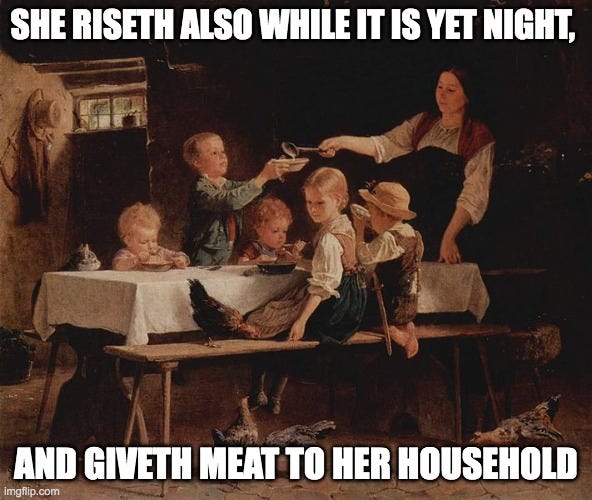
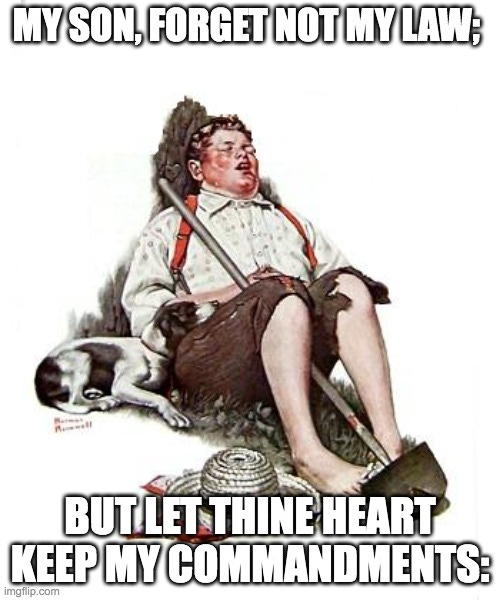

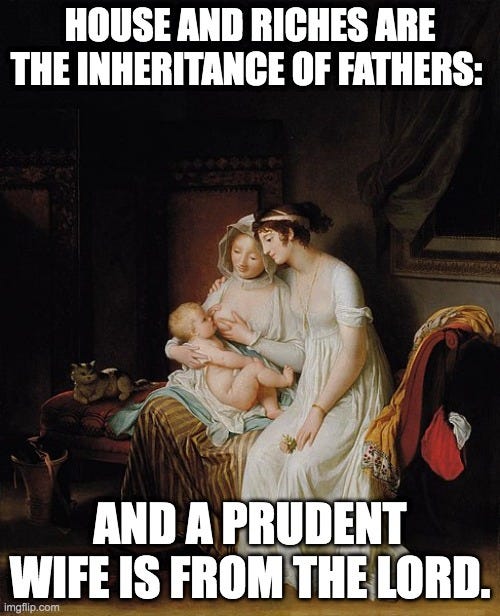

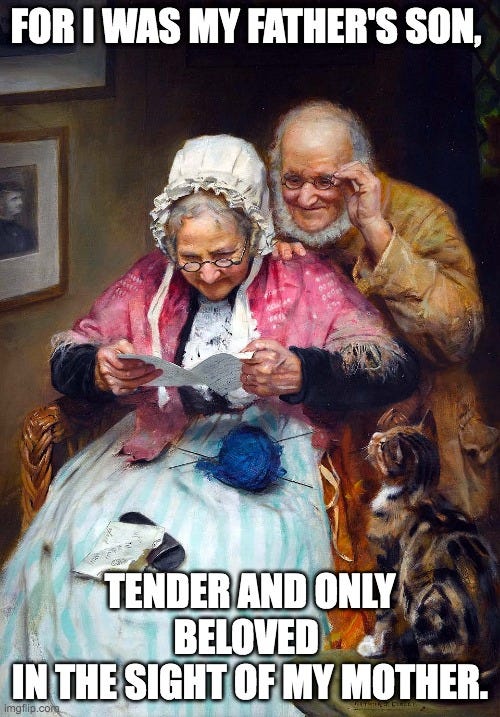
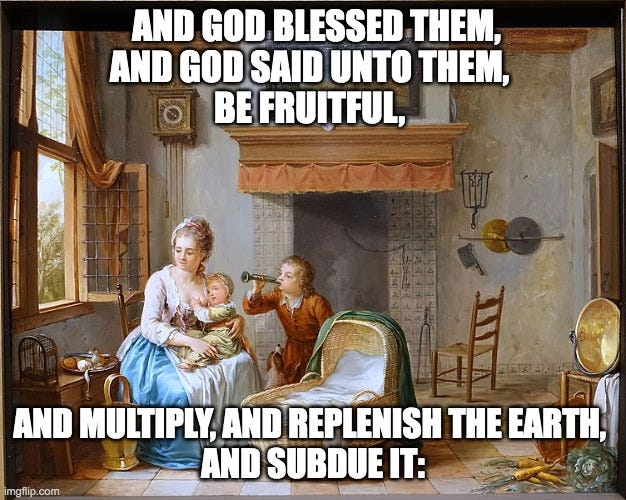



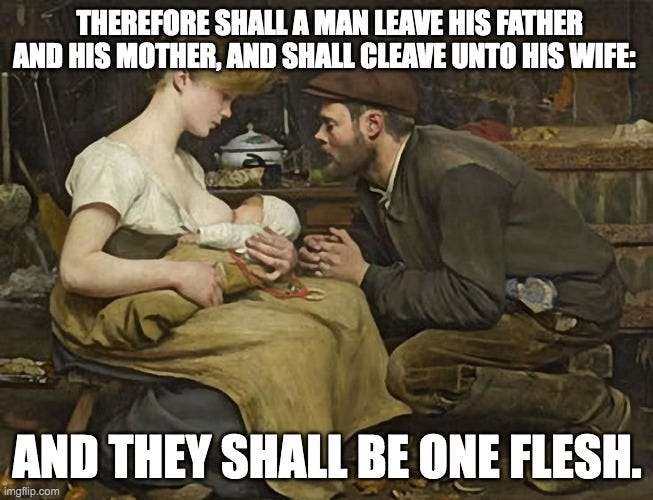
Men have more physical strength and are the protectors. Women reproduce and are extremely vulnerable under those conditions. Men rule the outer world and provide the living conditions. The female runs the home and is responsible for the offspring. Different functions of equal importance.
After reading the background material, I find myself feeling inadequately prepared to enter this discussion. But I will give it a try.
First a question. By replying in a comment, am I participating in a “letter exchange?” Or is there a more formal means?
Next a few points to position myself. I am a baby-boomer, semi-retired from a reasonably prosperous engineering career. I am a husband, father, and grandfather. I grew up on a farm and have lived my entire adult life in the same mid-sized community in the Midwest. I am a Christian practicing with all the confusion of modern ELCA Lutherans. I love respectful arguments with thoughtful points on virtually any topic. I argue from a perspective that common sense, experience, and faith should not be dismissed as source material. I love to explore new ideas, but my skeptical streak appears when academic studies defy conventional wisdom with claims of scientific certainty. So, I have plenty to think about these days!
I am aware of the conflicting views on patriarchy, but I am not as versed as other commentors in the anthropology, versus the natural order argument, versus the divinely ordained argument. When I use the word “patriarchy,” my context is “the institution that is or was the enemy of classic feminism.”
It will take me a few days to offer my letter.